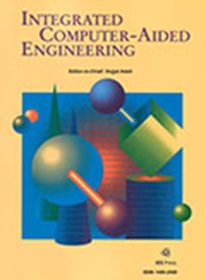Evolution of a model journal in the era of digital revolution
IF 5.3
2区 计算机科学
Q1 COMPUTER SCIENCE, ARTIFICIAL INTELLIGENCE
引用次数: 0
Abstract
The scientific journal Integrated Computer-Aided Engineering (ICAE) is approaching its 30th anniversary. For nearly three decades it has been promoting innovative multidisciplinary research with absolute consistency, maintaining the highest standards of quality without compromise. The scientific community has honored ICAE with its trust and with a very high impact factor. I wish to thank the Editor in Chief Professor Hojjat Adeli, for giving me the chance to write and publish this brief analysis. We are grateful for his invaluable contribution. The recent flourishing of the 4th Industrial Revolution (4IR) is calling for interdisciplinary research efforts, aiming in the development of intelligent nonlinear models applied in every real-life domain. ICAE is a leading journal for the dissemination of timely synergistic research efforts in the fields of Engineering and Information-Communication technologies. It opens new frontiers for solving complex problems to meet the needs of our post-modern 21st century societies. A major part of the research papers published in the journal during the past three decades has been related mainly but not limited to a wide spectrum of Artificial Intelligence (AI) algorithms and approaches. In the 4IR era, the technological developments in the field of Intelligent Information Systems are rapid and having a decisive impact on the respective engineering applications. And ICAE has been at the forefront of this developments. The following Fig. ??, shows the frequency distribution of the topics covered by the journal’s publications during the past two years (2018–2019). More specifically, 15 published papers are in the thematic area of Image-Video Processing (IMVP), 12 are related to Machine Learning (ML), 9 to Robotics, and 8 to Optimization (OPT). It is of great importance that the ICAE journal also covers a wide spectrum of topics namely: Big Data, Filtering, Control Systems, Autonomous Vehicles, Cognitive modeling and Bioinformatics. ML publications are related to Classification, Ensembles, Deep – Convolutional and Transfer Learning algorithms with respective applications. On the other hand, OPT papers have employed Meta Heuristic approaches. A comparison of the 2012–2013 article list with 2018–2019 article list shows many additional research数字革命时代期刊模式的演变
科学期刊《综合计算机辅助工程》(ICAE)即将迎来30周年纪念。近三十年来,它一直以绝对的一致性促进创新的多学科研究,保持最高的质量标准而不妥协。科学界对ICAE的信任和非常高的影响因子给予了荣誉。我要感谢主编Hojjat Adeli教授给我机会撰写和发表这篇简短的分析。我们感谢他的宝贵贡献。最近第四次工业革命(4IR)的蓬勃发展要求跨学科的研究努力,旨在开发应用于每个现实生活领域的智能非线性模型。ICAE是在工程和信息通信技术领域及时传播协同研究成果的领先期刊。它为解决复杂问题开辟了新的领域,以满足我们后现代21世纪社会的需求。在过去的三十年里,在该杂志上发表的大部分研究论文主要涉及但不限于广泛的人工智能(AI)算法和方法。在第四次工业革命时代,智能信息系统领域的技术发展迅速,并对相应的工程应用产生决定性的影响。ICAE一直走在这一发展的前沿。下图:??,显示了该期刊出版物在过去两年(2018-2019年)所涵盖主题的频率分布。更具体地说,15篇发表的论文是在图像视频处理(IMVP)的主题领域,12篇与机器学习(ML)有关,9篇与机器人技术有关,8篇与优化(OPT)有关。重要的是,ICAE期刊还涵盖了广泛的主题,即:大数据,过滤,控制系统,自动驾驶汽车,认知建模和生物信息学。机器学习出版物涉及分类、集成、深度卷积和迁移学习算法及其各自的应用。另一方面,OPT论文采用了元启发式方法。将2012-2013年的文章列表与2018-2019年的文章列表进行比较,可以发现许多额外的研究
本文章由计算机程序翻译,如有差异,请以英文原文为准。
求助全文
约1分钟内获得全文
求助全文
来源期刊

Integrated Computer-Aided Engineering
工程技术-工程:综合
CiteScore
9.90
自引率
21.50%
发文量
21
审稿时长
>12 weeks
期刊介绍:
Integrated Computer-Aided Engineering (ICAE) was founded in 1993. "Based on the premise that interdisciplinary thinking and synergistic collaboration of disciplines can solve complex problems, open new frontiers, and lead to true innovations and breakthroughs, the cornerstone of industrial competitiveness and advancement of the society" as noted in the inaugural issue of the journal.
The focus of ICAE is the integration of leading edge and emerging computer and information technologies for innovative solution of engineering problems. The journal fosters interdisciplinary research and presents a unique forum for innovative computer-aided engineering. It also publishes novel industrial applications of CAE, thus helping to bring new computational paradigms from research labs and classrooms to reality. Areas covered by the journal include (but are not limited to) artificial intelligence, advanced signal processing, biologically inspired computing, cognitive modeling, concurrent engineering, database management, distributed computing, evolutionary computing, fuzzy logic, genetic algorithms, geometric modeling, intelligent and adaptive systems, internet-based technologies, knowledge discovery and engineering, machine learning, mechatronics, mobile computing, multimedia technologies, networking, neural network computing, object-oriented systems, optimization and search, parallel processing, robotics virtual reality, and visualization techniques.
 求助内容:
求助内容: 应助结果提醒方式:
应助结果提醒方式:


